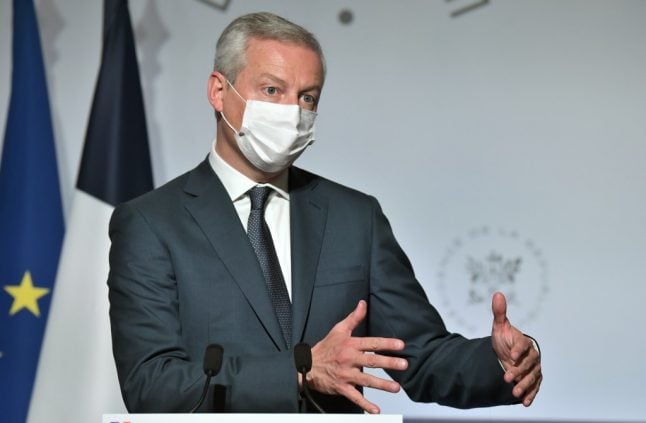After €460 billion of emergency spending this year to save the economy from the virus fallout, the government built its 2021 budget plan around a €100-billion “recovery plan”, first announced this month and partly funded by EU money.
The budget came after France's health services on Saturday reported 14,412 new virus cases over the previous 24 hours – only slightly lower than the record 16,000 registered on both Thursday and Friday.
READ ALSO IN NUMBERS Covid-19 cases, hospitalisations and deaths in France
The fresh spike threatens to overwhelm hospitals, health officials warned, while the government imposed fresh curbs to limit the spread of the virus, including on restaurants, bars and sports facilities.
“There is no reason to give up the idea of a recovery just because the health difficulties have re-emerged,” Finance Minister Bruno Le Maire told a news conference.
The spending boost is to help the French economy to rebound strongly next year, by eight percent according to the budget, after crashing by an expected 10 percent this year, Le Maire said.
“We are implementing this recovery fund so it can be used up quickly and have the greatest possible impact on growth,” he said.
But the growth forecast immediately drew criticism from France's high council for public finance, a state body charged with making sure that government budgetary assumptions are realistic.
The growth target was “pro-active”, given the “great uncertainties” weighing on the economic outlook because of the coronavirus, the council said.
It also called on the government to be mindful of public debt which has ballooned since the start of the crisis.
France's annual deficit is estimated at 10.2 percent of GDP this year, and is to come in at 6.7 percent in 2021, the government said.
This compares with a permitted ceiling of three percent for eurozone countries, which the EU has however lifted temporarily as governments grapple with the crisis.
The government has promised that it will not raise taxes to pay for the recovery.



 Please whitelist us to continue reading.
Please whitelist us to continue reading.
Your letting me sign fir membership ng you wrote IM exceeded to trials snd IM a member for 3 yrs renewable